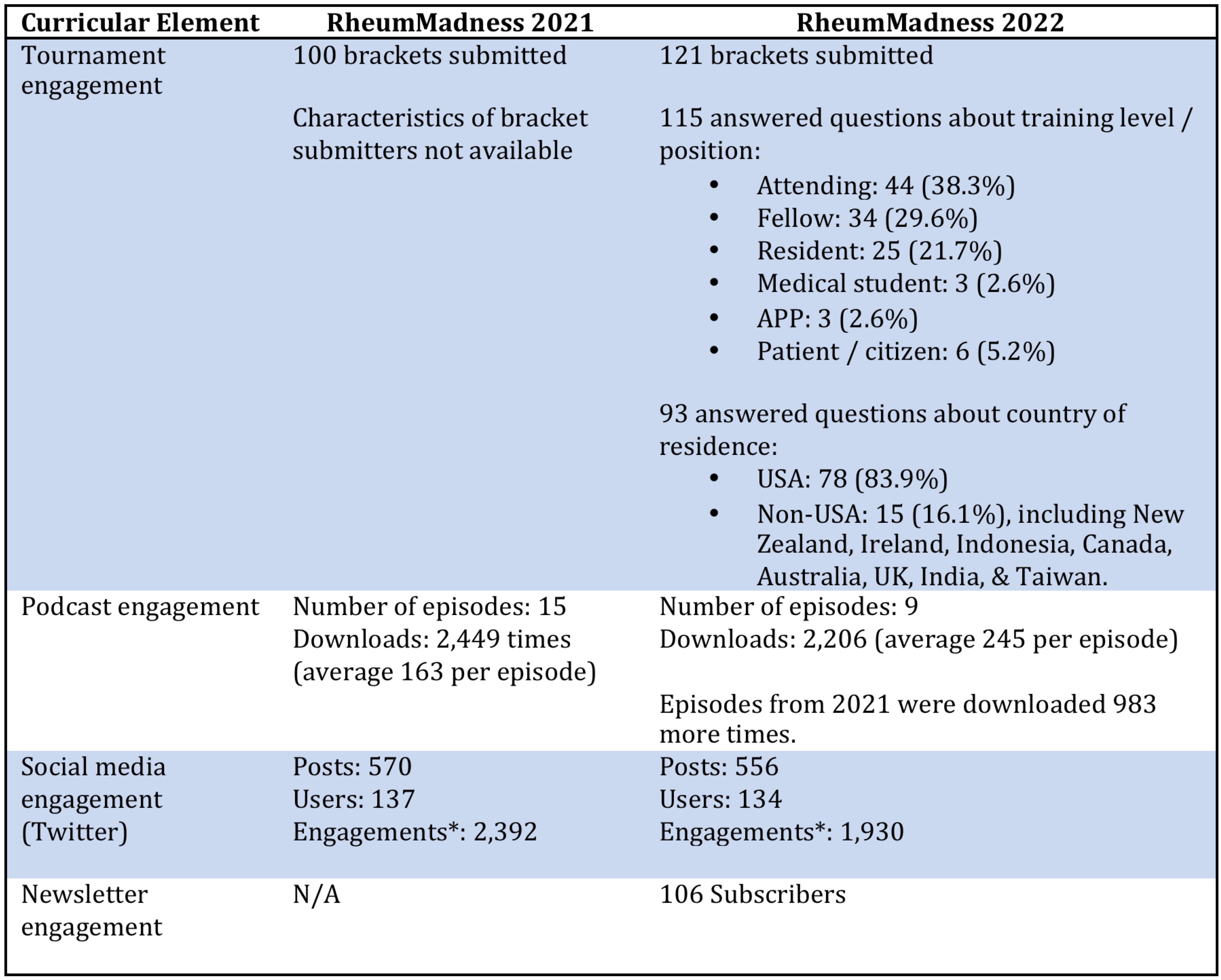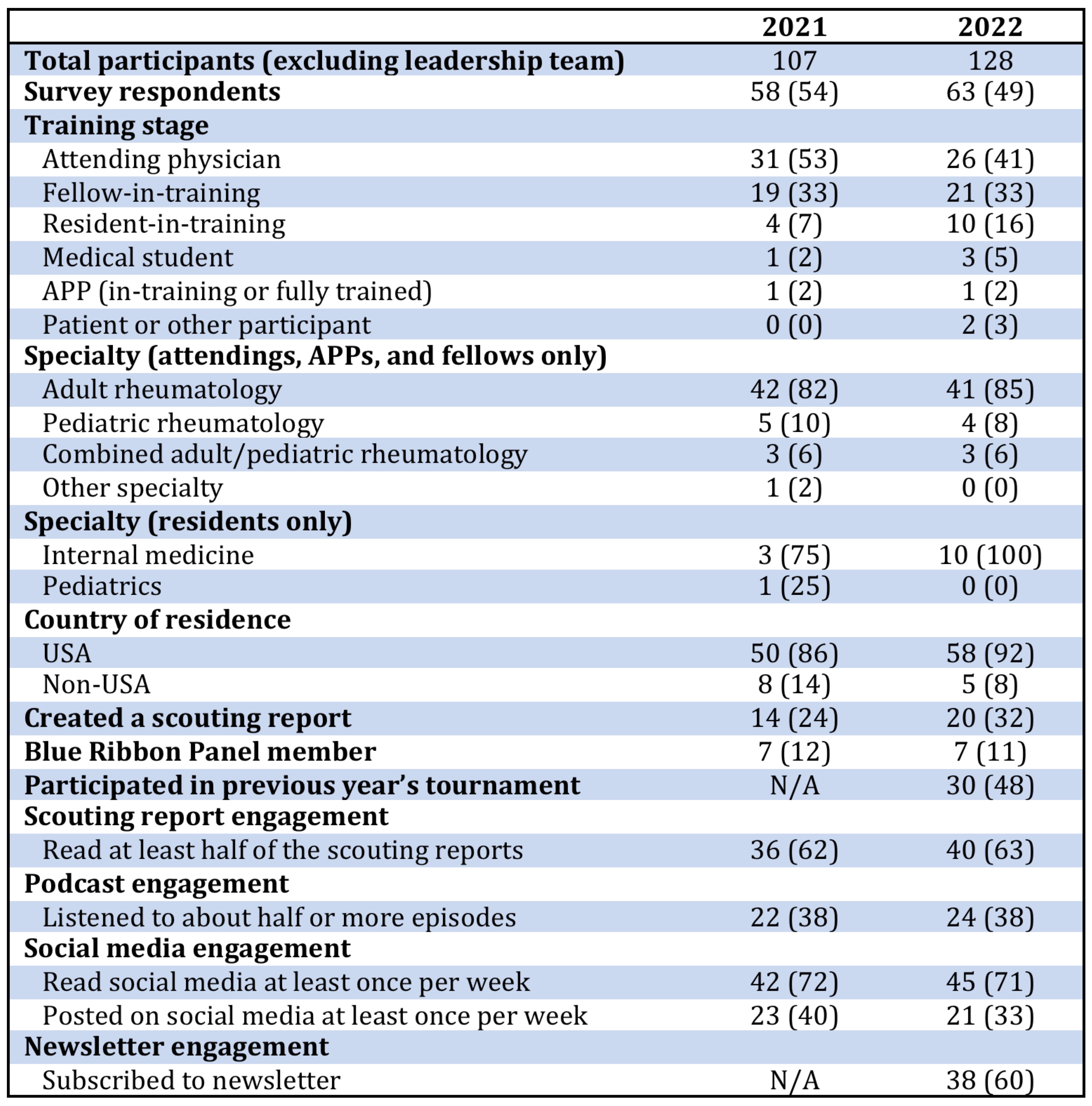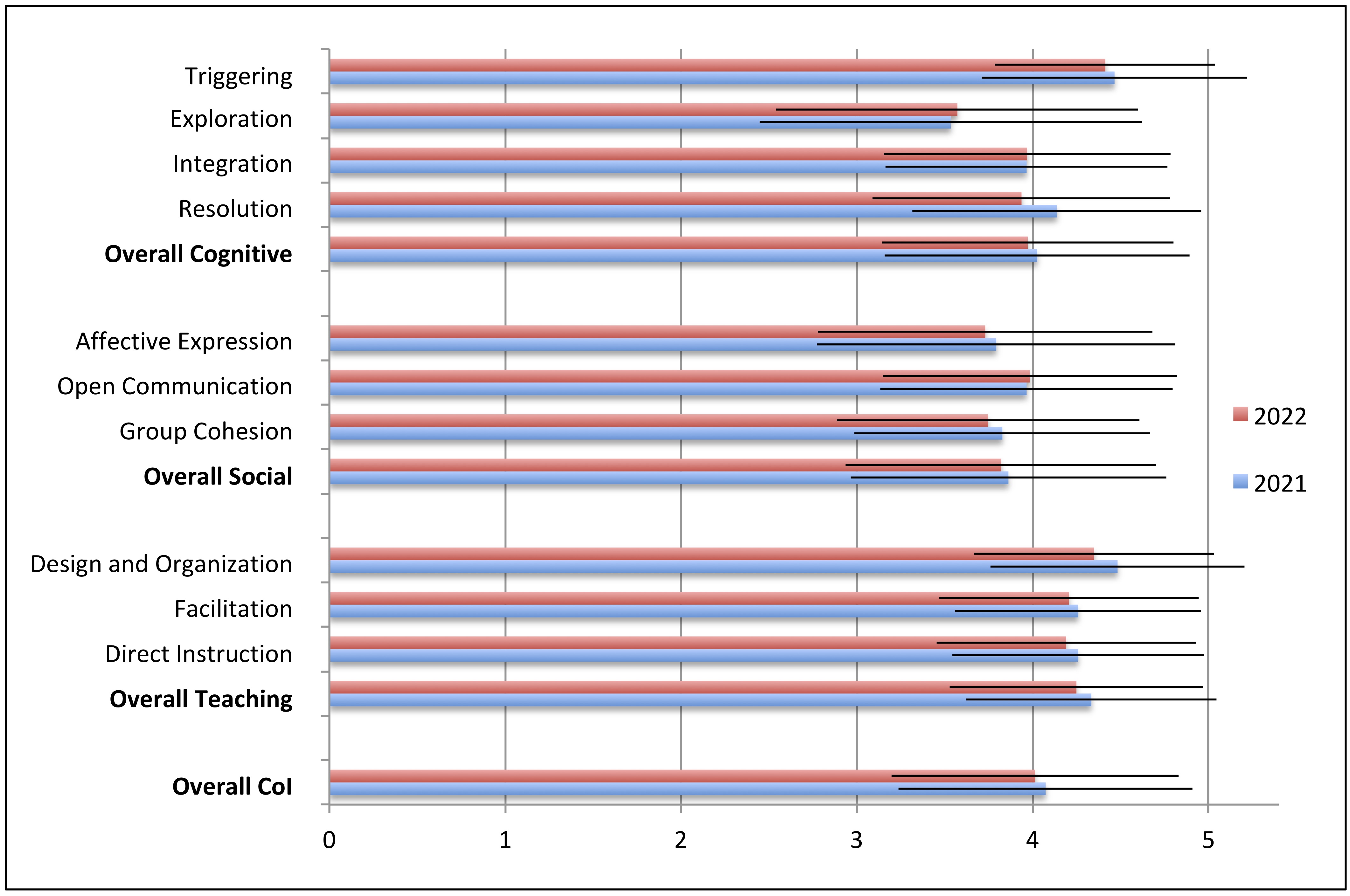Back
Poster Session A
Professional development and education
Session: (0214–0240) Professional Education Poster
0238: Educational Experience and Engagement in the First Two Years of RheumMadness, an Online Community of Inquiry
Saturday, November 12, 2022
1:00 PM – 3:00 PM Eastern Time
Location: Virtual Poster Hall
- GK
Guy Katz, MD
Massachusetts General Hospital
Boston, MA, United States
Abstract Poster Presenter(s)
Guy Katz1, Aki Garren2, Lauren He3, Ben Kellogg4, Michael Macklin5, Courtney Bair4, matthew Sparks4, Lisa Criscione-Schreiber4 and david leverenz4, 1Massachusetts General Hospital, Boston, MA, 2MedStar/Georgetown Washington Hospital Center, Silver Spring, MD, 3University of Chicago, Chicago, IL, 4Duke University School of Medicine, Durham, NC, 5University of Pittsburg Medical Center, Pittsburgh, PA
Background/Purpose: RheumMadness, an online educational initiative in which 16 rheumatology concepts compete as teams, completed its second season in 2022. In its first year, RheumMadness demonstrated success in engaging learners using the Community of Inquiry (CoI) framework, which evaluates cognitive, social, and teaching "presences." After implementing changes to the tournament for its second year, we aimed to evaluate the educational experience of RheumMadness participants over its first two years.
Methods: RheumMadness consists of 16 rheumatology concepts that compete in a four-round single-elimination bracket. In 2021, the teams were based on specific manuscripts (e.g., clinical trials, guidelines) recently published in the rheumatology literature; in 2022, the teams were designed to represent broad rheumatology concepts with 1-2 base articles that provided an overview of those concepts. Scouting reports, describing the background and significance of each team and the projected chances of winning the tournament, were written largely by trainees ( >40 in 2021 and >60 in 2022). Participants in the tournament submitted brackets of predicted outcomes, and winners of each round were decided by a 7-member Blue Ribbon Panel (BRP) of rheumatologists. In 2022, an email newsletter was established in an attempt to increase participation outside of social media (SoMe). Participants completed surveys assessing RheumMadness engagement and learning experience using questions adapted from a validated CoI survey. Likert scores ranging from 1 ("strongly disagree") to 5 ("strongly agree") were used. Comparisons between 2021 and 2022 were done via unpaired T tests.
Results: Engagement in RheumMadness 2021 and 2022 is summarized in Table 1. In 2022, there were more brackets submitted (121 vs. 100). While there were fewer podcast episodes in 2022, there were more downloads per episode (245 vs. 163) in 2022. On Twitter, there were similar numbers of posts (556 vs 570), but engagements (likes, retweets, replies) were slightly lower in 2022 (1,930 vs. 2,392). Among participants who completed post-tournament surveys, characteristics and engagement were similar between the two years (Table 2). There was high engagement in all CoI presences, with mean Likert scores ranging from 3.5 to 4.5; there were no significant differences between the two years (Figure 1).
Conclusion: RheumMadness engagement and educational experience were high in the first two years of the tournament. There was a small reduction in engagements with posts on SoMe in 2022, though learners also had the ability to engage with RheumMadness through the introduction of a newsletter. Broadening the scope of topics reviewed in the tournament had no net impact on the CoI presences with which participants engaged.
 Table 1. Direct metrics of engagement with RheumMadness, 2021 and 2022. *Twitter engagements included interactions with tweets such as likes, retweets, and replies.
Table 1. Direct metrics of engagement with RheumMadness, 2021 and 2022. *Twitter engagements included interactions with tweets such as likes, retweets, and replies.
 Table 2. Participant characteristics and engagement, 2021 vs 2022. All values reported as n (%) unless noted otherwise. APP: Advanced practice provider.
Table 2. Participant characteristics and engagement, 2021 vs 2022. All values reported as n (%) unless noted otherwise. APP: Advanced practice provider.
 Figure 1. Participant educational experience using the Community of Inquiry framework, 2021 vs 2022. All comparisons between 2021 and 2022 are not statistically significant.
Figure 1. Participant educational experience using the Community of Inquiry framework, 2021 vs 2022. All comparisons between 2021 and 2022 are not statistically significant.
Disclosures: G. Katz, None; A. Garren, None; L. He, None; B. Kellogg, None; M. Macklin, None; C. Bair, None; m. Sparks, Renal Research Institute, American Board of Internal Medicine, NephJC, American Journal of Kidney Diseases, Kidney360, Kidney Medicine, ASN Kidney News, KCVD Membership & Communications Committee- AHA, Elsevier- Nephrology Secrets, KCVD Scientific & Clinical Education Lifelong Learning Committee (SCILL)- AHA, NKF North Carolina; L. Criscione-Schreiber, GlaxoSmithKlein(GSK); d. leverenz, Pfizer, Rheumatology Research Fund.
Background/Purpose: RheumMadness, an online educational initiative in which 16 rheumatology concepts compete as teams, completed its second season in 2022. In its first year, RheumMadness demonstrated success in engaging learners using the Community of Inquiry (CoI) framework, which evaluates cognitive, social, and teaching "presences." After implementing changes to the tournament for its second year, we aimed to evaluate the educational experience of RheumMadness participants over its first two years.
Methods: RheumMadness consists of 16 rheumatology concepts that compete in a four-round single-elimination bracket. In 2021, the teams were based on specific manuscripts (e.g., clinical trials, guidelines) recently published in the rheumatology literature; in 2022, the teams were designed to represent broad rheumatology concepts with 1-2 base articles that provided an overview of those concepts. Scouting reports, describing the background and significance of each team and the projected chances of winning the tournament, were written largely by trainees ( >40 in 2021 and >60 in 2022). Participants in the tournament submitted brackets of predicted outcomes, and winners of each round were decided by a 7-member Blue Ribbon Panel (BRP) of rheumatologists. In 2022, an email newsletter was established in an attempt to increase participation outside of social media (SoMe). Participants completed surveys assessing RheumMadness engagement and learning experience using questions adapted from a validated CoI survey. Likert scores ranging from 1 ("strongly disagree") to 5 ("strongly agree") were used. Comparisons between 2021 and 2022 were done via unpaired T tests.
Results: Engagement in RheumMadness 2021 and 2022 is summarized in Table 1. In 2022, there were more brackets submitted (121 vs. 100). While there were fewer podcast episodes in 2022, there were more downloads per episode (245 vs. 163) in 2022. On Twitter, there were similar numbers of posts (556 vs 570), but engagements (likes, retweets, replies) were slightly lower in 2022 (1,930 vs. 2,392). Among participants who completed post-tournament surveys, characteristics and engagement were similar between the two years (Table 2). There was high engagement in all CoI presences, with mean Likert scores ranging from 3.5 to 4.5; there were no significant differences between the two years (Figure 1).
Conclusion: RheumMadness engagement and educational experience were high in the first two years of the tournament. There was a small reduction in engagements with posts on SoMe in 2022, though learners also had the ability to engage with RheumMadness through the introduction of a newsletter. Broadening the scope of topics reviewed in the tournament had no net impact on the CoI presences with which participants engaged.
 Table 1. Direct metrics of engagement with RheumMadness, 2021 and 2022. *Twitter engagements included interactions with tweets such as likes, retweets, and replies.
Table 1. Direct metrics of engagement with RheumMadness, 2021 and 2022. *Twitter engagements included interactions with tweets such as likes, retweets, and replies. Table 2. Participant characteristics and engagement, 2021 vs 2022. All values reported as n (%) unless noted otherwise. APP: Advanced practice provider.
Table 2. Participant characteristics and engagement, 2021 vs 2022. All values reported as n (%) unless noted otherwise. APP: Advanced practice provider. Figure 1. Participant educational experience using the Community of Inquiry framework, 2021 vs 2022. All comparisons between 2021 and 2022 are not statistically significant.
Figure 1. Participant educational experience using the Community of Inquiry framework, 2021 vs 2022. All comparisons between 2021 and 2022 are not statistically significant.Disclosures: G. Katz, None; A. Garren, None; L. He, None; B. Kellogg, None; M. Macklin, None; C. Bair, None; m. Sparks, Renal Research Institute, American Board of Internal Medicine, NephJC, American Journal of Kidney Diseases, Kidney360, Kidney Medicine, ASN Kidney News, KCVD Membership & Communications Committee- AHA, Elsevier- Nephrology Secrets, KCVD Scientific & Clinical Education Lifelong Learning Committee (SCILL)- AHA, NKF North Carolina; L. Criscione-Schreiber, GlaxoSmithKlein(GSK); d. leverenz, Pfizer, Rheumatology Research Fund.

